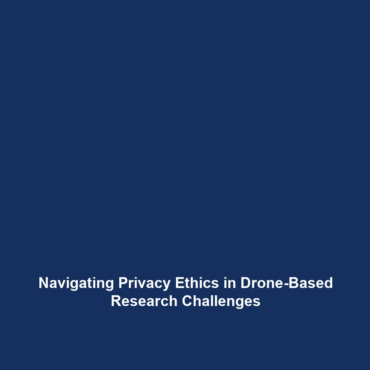Privacy and Ethics: Challenges in Drone-Based Research
Introduction
The integration of drones in scientific research has revolutionized various fields, from environmental monitoring to wildlife studies. However, as drones in science become more prevalent, concerns regarding privacy and ethics arise. These challenges not only impact public perception but also influence the legality and feasibility of drone applications. Understanding these issues is crucial for researchers and stakeholders involved in drone-based research, ensuring that scientific advancements do not compromise individual rights and ethical standards.
Key Concepts
Several key concepts underpin the privacy and ethics challenges associated with drone-based research. These include:
1. Informed Consent
Obtaining consent from individuals before conducting research can be complex, especially in public spaces.
2. Data Protection
Securing sensitive information gathered by drones poses significant ethical and legal challenges.
3. Surveillance Concerns
Widespread drone usage could lead to potential abuse or overreach in terms of surveillance.
4. Regulatory Frameworks
Existing laws may not adequately address the unique challenges posed by drone technology, requiring revisions and updates.
Applications and Real-World Uses
The privacy and ethics challenges in drone-based research play a critical role in shaping its applications across various scientific disciplines:
- Agriculture: Drones monitor crop health but must respect landowner privacy.
- Environmental Studies: Drones assess wildlife populations while considering the impact of human intrusion.
- Urban Planning: Drones gather data for city development, highlighting the need for public engagement and consent.
Understanding how privacy and ethics inform drone research is essential for ensuring responsible use in scientific applications.
Current Challenges
The integration of drones in research faces several current challenges related to privacy and ethics:
- Unclear legal frameworks regarding data usage.
- Lack of public understanding and trust in drone technology.
- Risk of incidental data collection leading to potential violations of privacy.
- Need for robust protocols to handle sensitive data.
Future Research and Innovations
Advancements in technology and research methodologies are expected to address many of the existing challenges associated with privacy and ethics in drone-based research:
- Development of privacy-aware drones that limit data collection to essential information.
- Establishment of ethical guidelines and best practices for researchers.
- Enhanced data encryption methods to ensure information security.
These innovations are vital to cultivating a sustainable future for drones in science.
Conclusion
As drone technology continues to evolve, addressing the privacy and ethics challenges in drone-based research remains paramount. Stakeholders must prioritize ethical considerations to harness the full potential of drones in advancing scientific research while respecting individual rights. For further insights on the implications of drones in science, explore additional resources on this topic and participate in ongoing discussions about ethical frameworks.






